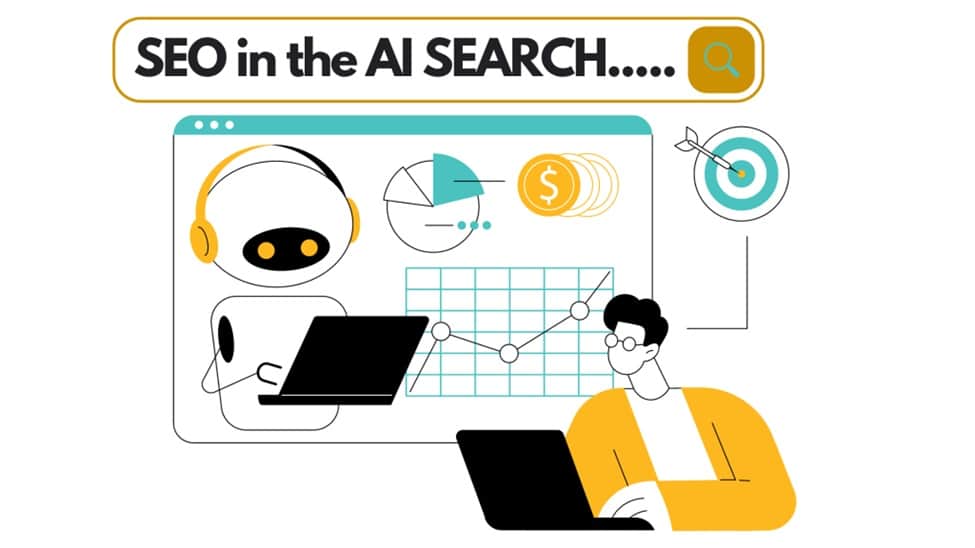The digital realm is in a constant state of flux, with innovations continually reshaping our online experiences. Among the most groundbreaking of these innovations is the emergence of AI search. As this new dawn approaches, there’s a palpable mix of excitement and apprehension within the industry. Some experts are heralding it as the next big thing, while others fear it might signal the end of traditional SEO and a potential dip in web traffic.However, such black-and-white viewpoints often miss the nuanced reality. AI search isn’t just another tool in the digital arsenal; it’s a game-changer that promises to redefine how we search, find, and consume online content. At the heart of this transformation lies a concept that’s both old and new: qualified clicks. This term, once confined to the realms of Pay-Per-Click (PPC) and affiliate marketing, is now taking on a broader, more profound significance.
What are qualified clicks?
But what exactly are qualified clicks, and why are they becoming so crucial in the age of AI search? In essence, they represent a shift from quantity to quality, from indiscriminate browsing to purpose-driven searching. Instead of inundating users with a barrage of links, AI search aims to provide them with the most relevant, context-specific results, enhancing both user experience and engagement.
This focus on relevance and context is not just a technological upgrade; it’s a philosophical one. It signifies a move away from the impersonal, algorithm-driven searches of the past towards a more personalized, user-centric approach. The goal is no longer just to provide answers but to understand the questioner, to discern not just what they’re looking for, but why.
As we stand on the cusp of this new era, it’s essential to demystify AI search and explore its potential implications and opportunities.
Understanding AI Search
From the early days of basic keyword matching to the sophisticated algorithms of today, search engines have continually adapted to better serve user needs. Now, as we stand on the precipice of another significant shift, it’s crucial to understand the nuances of AI search and its potential impact on the world of online search.
The Evolution of Search
The journey of search engines has been marked by constant innovation. Initially, they operated on simple keyword-based algorithms, often returning vast amounts of irrelevant information. Over time, these algorithms became more sophisticated, incorporating various factors like user behavior, site quality, and link profiles to deliver more accurate results.
Today, with the integration of AI, we’re witnessing the next phase in this evolution. AI search promises a level of precision and personalization previously deemed unattainable.
The Distinct Nature of AI Search
Traditional search engines operate on predefined algorithms, sifting through vast data to find matches for user queries. In contrast, AI search engines learn and adapt. They process information, understand context, and refine their algorithms based on user interactions.
This dynamic nature ensures that AI search is not just different but superior in many aspects. It’s not about replacing human intelligence but augmenting it, providing users with results that resonate with their intent.
Insights from the Experts
The significance of AI in search isn’t just a speculative topic; industry experts have weighed in with their insights. Fabrice Canel, a notable figure from Bing, introduced the concept of qualified clicks in the context of AI search.
This term, traditionally associated with PPC and affiliate marketing, is now being viewed through a new lens. In the world of AI search, a qualified click represents the perfect alignment of user intent and search results, ensuring that every click adds value.
Relevance of Qualified Clicks
The beauty of AI search lies in its ability to discern user intent. It’s not just about matching keywords but understanding the context behind them. This focus on intent ensures that every result, every link, is relevant to the user. And this relevance is what defines a qualified click. In the vast ocean of online information, AI search acts as a beacon, guiding users to the most pertinent information.
The Mechanics of Qualified Clicks
In the vast and intricate world of search engines, the term qualified clicks stands out as a beacon of change. But to truly appreciate its significance, one must first understand its mechanics and the transformative potential it holds for the future of online search.
The Essence of a Qualified Click
At its core, a qualified click is more than just a user action; it’s a testament to the relevance and precision of search results.
Imagine reading an in-depth article about a specific topic, feeling compelled to learn more, and then being presented with a link that perfectly aligns with your current interest. That link, which seamlessly transitions you from curiosity to knowledge, epitomizes a qualified click. It’s not about volume but value, ensuring that every click is purpose-driven and meaningful.
Contextual Links – The Gold Standard
In the realm of online marketing, context is king. A link that resonates with the surrounding content holds immense power. It’s not just a pathway to another webpage but a bridge to relevant information.
Those who have ventured into affiliate marketing or content-driven campaigns can vouch for the unparalleled efficacy of contextual links. They don’t merely drive traffic; they foster engagement, ensuring that users find precisely what they’re seeking.
AI Search Engines – Masters of Precision
Traditional search engines, for all their merits, often operate on a trial-and-error basis, presenting users with multiple links and hoping one resonates. AI search engines, on the other hand, prioritize precision over proliferation.
They harness advanced algorithms and deep learning to understand user intent, ensuring that the results presented are not just relevant but perfectly aligned with the user’s current context. This focus on precision ensures that users are not inundated with options but presented with the most pertinent results.
The User-Centric Approach of AI Search
One of the most commendable aspects of AI search engines is their unwavering focus on the user. Platforms like Bing Chat, as highlighted by Fabrice Canel, empower users to ask layered, intricate questions, providing the search engine with a crystal-clear context. This clarity ensures that the results presented are not just accurate but tailor-made for the user, eliminating the need for endless scrolling and refining of search queries.
The Superiority of AI Search Results
The digital age has witnessed numerous innovations, but few have been as transformative as the integration of Artificial Intelligence into search engines. This fusion has not only redefined the mechanics of search but has also elevated the quality of results, underscoring the superiority of AI search results.
- Eliminating Ambiguity: Traditional search engines, despite their advancements, often grapple with the challenge of ambiguity. Users inputting short, vague keywords can lead to a plethora of results, many of which might be irrelevant. AI search, however, thrives on clarity.
By processing vast amounts of data and understanding user behavior, AI search engines can discern the underlying intent behind queries, ensuring results that are spot-on. This precision eliminates the guesswork, providing users with answers that truly resonate with their needs.
- Conversational Clarity: One of the standout features of AI search is its ability to process conversational language. Instead of relying on disjointed keywords, users can pose detailed, complex questions, much like they would in a real conversation.
This natural interaction provides AI search engines with a richer context, enabling them to deliver results that are not just accurate but deeply relevant.
- Quality Over Quantity: The traditional metric of success for search engines has often been the number of results. However, AI search challenges this notion, prioritizing the quality of results over sheer volume. Instead of inundating users with countless links, AI search engines present a curated list of the most pertinent results.
Each link, each result, is a testament to the engine’s understanding of user intent, ensuring that every click is a qualified click.
- The Promise of Personalization: At its core, AI is about learning and adapting. AI search engines continually refine their algorithms based on user interactions, ensuring a level of personalization previously deemed unattainable.
This dynamic approach ensures that every user’s experience is tailor-made, reflecting their preferences, search history, and unique needs.
Embracing the AI Search Experience
As AI search emerges as a dominant force, it’s imperative for the SEO community and digital marketers to embrace this new paradigm and understand its profound implications.
- Shifting Focus from SERPs: The traditional focus on Search Engine Results Pages (SERPs) is undergoing a transformation. While SERPs remain crucial, Fabrice Canel emphasizes the increasing significance of the chat experience.
AI search engines, with their conversational interfaces, offer users a more interactive, dialogue-driven search experience. This shift underscores the need for SEO strategies to adapt and cater to this new mode of interaction.
- The Power of Perfect Clicks: AI search doesn’t just aim to provide answers; it strives for perfection. Every result, every link, is meticulously curated to align with the user’s intent. This precision ensures that the clicks generated are not just numerous but stellar in quality. These are the clicks that drive engagement, foster loyalty, and enhance user satisfaction.
- Redefining User Experience: The advent of AI search heralds a new era of user-centricity. Instead of passive interactions, users are now active participants, engaging in rich dialogues with search engines. This dynamic interaction ensures a more personalized, tailored search experience, reflecting the unique needs and preferences of each user.
- A Call to the SEO Community: As AI search continues to reshape the digital landscape, it’s a clarion call for the SEO community to adapt and innovate. Embracing the AI search experience isn’t just about leveraging new tools; it’s about reimagining SEO strategies, prioritizing user intent, and delivering content that resonates on a deeper, more personal level.
FAQs
Here, we address some of the most frequently asked queries to shed light on this transformative innovation.
Conclusion
The integration of Artificial Intelligence into search engines marks a transformative moment in the digital age. As we’ve explored, the rise of AI search isn’t just a technological advancement but a paradigm shift, redefining how we search, find, and interact with online content. The emphasis on qualified clicks, user intent, and personalized experiences underscores the promise of AI: a more intuitive, responsive, and user-centric digital landscape. As we navigate this new frontier, the challenge lies not in resisting change but in embracing it, recognizing the unparalleled opportunities it presents. The future of search is here, and it’s powered by AI.





















